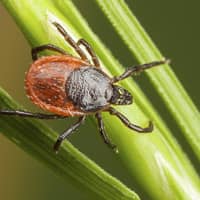
Professional Tick Exterminator Services in Your Area

Ticks are a parasitic pest and in most species both the female and male feed on the blood of mammals, birds, and even reptiles. Ticks are actually a type of arachnid and therefore as adults have 4 pair of legs, but as a larva they only have 3 pair of legs. The coloring and size of a tick is species dependent. Ticks will hide in areas where their preferred hosts (deer, dogs, cats, livestock, and humans) can be found. Areas with dense vegetation, in wooded areas, and in high grasses.
Identifying Black Legged (Deer) Ticks
Black legged ticks are a very small species of tick they are a dark orange color and have distinctively darker legs. Deer ticks are commonly found in and around wooded areas. As their name suggests adults primarily feed on the blood of white-tailed deer. But, they will also feed on dogs, cats, rodents, and humans. Before a meal the adults are about 1/8th of an inch in length, and after a meal they become engorged and appear much larger.
Understanding American Dog Ticks
American dog ticks are a larger species than the black legged tick. Prior to eating a blood meal, an adult is about 3/16th of inch in length, and of course, after a meal they become engorged. Adults are brownish in color with white or yellow markings. These ticks can be found in parks, fields and along wooded paths. As their name suggests the domesticated dog is their preferred host, although, like other ticks, they will feed on any available host that walks their way.
Contact Us for Effective Tick Control Solutions
Dangers Associated With Ticks
Ticks can carry and transmit a variety of potentially dangerous diseases to people, pets, and other animals. Black legged deer ticks are common carriers of the bacterium Borrelia burgdorferi, the bacteria that causes Lyme disease. Lyme disease is a serious and debilitating disease. If left untreated Lyme can affect and the heart, nervous system and damage joints. Lyme disease can easily be passed to people and animals from the bite of a deer tick. Though not common in the New England region, American dog ticks can transmit diseases that include Rocky Mountain spotted fever and tularemia.
Signs Of Ticks
The most common sign that your property or home has a tick problem is by finding adults feeding on you or your pets. You may also find them crawling around on your shoes or clothing, especially after spending time outdoors.
Tick Prevention Tips From American Pest Solutions
Enlisting a professional pest service to keep your property free of ticks is the best and safest way to be sure that you are doing all you can do to keep ticks away from your loved ones. Here are some tips and precautions to take to help limit your actual exposure to tics on anyone, including your pets:
- Treat pets with a tick preventative under the guidance of a veterinarian.
- When spending time outdoors, especially in wooded areas or in heavy vegetation, be sure to wear long sleeves, long pants, a hat, and closed-toe shoes.
- After spending time outside you should inspect everyone, including your pets for ticks before entering your home.
- Grass on your property should be kept short and wooded areas trimmed back away from your lawn.
- Regularly vacuum carpeted areas and wash pet bedding in your house.
Getting Rid Of Ticks
Controlling ticks can be a difficult task. All of the adults, larva, and eggs need to be eliminated from your home to solve the problem. Because of this, the most effective, successful, and safe way to eliminate them is with the help of a professional pest control service. Keep everyone that you care about, including your pets, safe, healthy, and tick-free by contacting American Pest Solutions. We will help guard you against the threat of ticks.

Trust Massachusetts' oldest family owned pest control company to protect your family & home.